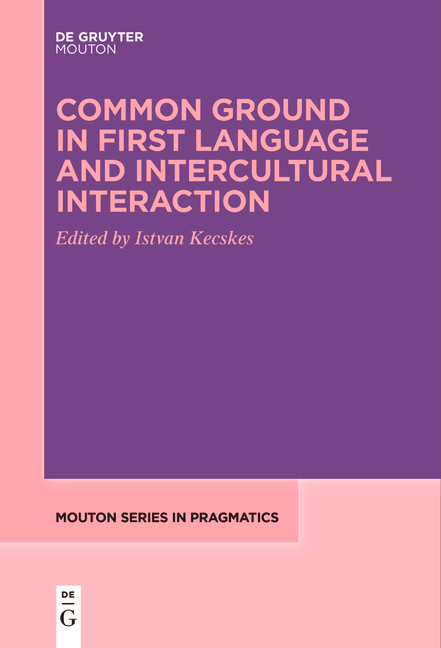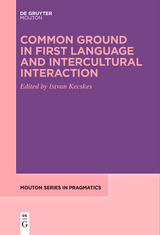Common Ground in First Language and Intercultural Interaction
Seiten
2023
de Gruyter Mouton (Verlag)
978-3-11-076672-1 (ISBN)
de Gruyter Mouton (Verlag)
978-3-11-076672-1 (ISBN)
Mouton Series in Pragmatics (MSP) is a timely response to the growing demand for innovative and authoritative monographs and edited volumes from all angles of pragmatics. Recent theoretical work on the semantics/pragmatics interface, applications of evolutionary biology to the study of language, and empirical work within cognitive and developmental psychology and intercultural communication has directed attention to issues that warrant reexamination, as well as revision of some of the central tenets and claims of the field of pragmatics. The series welcomes proposals that reflect this endeavour and exploration within the discipline and neighboring fields such as language philosophy, communication, information science, sociolinguistics, second language acquisition and cognitive science. MSP will provide a forum for authors who represent different subfields of pragmatics including the linguistic, cognitive, social, and intercultural paradigms, and have important and intriguing ideas and research findings to share with scholars who are interested in linguistics in general and pragmatics in particular.
In recent years the traditional approach to common ground as a body of information shared between participants of a communicative process has been challenged. Taking into account not only L1 but also intercultural interactions and attempting to bring together the traditional view with the egocentrism-based view of cognitive psychologists, it has been argued that construction of common ground is a dynamic, emergent process. It is the convergence of the mental representation of shared knowledge that we activate, assumed mutual knowledge that we seek, and rapport as well as knowledge that we co-construct in the communicative process. This dynamic understanding of common ground has been applied in many research projects addressing both L1 and intercultural interactions in recent years. As a result several new elements, aspects and interpretations of common ground have been identified. Some researchers came to view common ground as one component in a complex contextual information structure. Others, analyzing intercultural interactions, pointed out the dynamism of the interplay of core common ground and emergent common ground. The book brings together researchers from different angles of pragmatics and communication to examine (i) what adjustments to the notion of common ground based on L1 communication should be made in the light of research in intercultural communication; (ii) what the relationship is between context, situation and common ground, and (iii) how relevant knowledge and content get selected for inclusion into core and emergent common ground.
In recent years the traditional approach to common ground as a body of information shared between participants of a communicative process has been challenged. Taking into account not only L1 but also intercultural interactions and attempting to bring together the traditional view with the egocentrism-based view of cognitive psychologists, it has been argued that construction of common ground is a dynamic, emergent process. It is the convergence of the mental representation of shared knowledge that we activate, assumed mutual knowledge that we seek, and rapport as well as knowledge that we co-construct in the communicative process. This dynamic understanding of common ground has been applied in many research projects addressing both L1 and intercultural interactions in recent years. As a result several new elements, aspects and interpretations of common ground have been identified. Some researchers came to view common ground as one component in a complex contextual information structure. Others, analyzing intercultural interactions, pointed out the dynamism of the interplay of core common ground and emergent common ground. The book brings together researchers from different angles of pragmatics and communication to examine (i) what adjustments to the notion of common ground based on L1 communication should be made in the light of research in intercultural communication; (ii) what the relationship is between context, situation and common ground, and (iii) how relevant knowledge and content get selected for inclusion into core and emergent common ground.
lt;p>Istvan Kecskes, State University of New York at Albany, USA.
| Erscheinungsdatum | 14.02.2023 |
|---|---|
| Reihe/Serie | Mouton Series in Pragmatics [MSP] ; 26 |
| Zusatzinfo | 13 b/w ill., 12 b/w tbl. |
| Verlagsort | Basel/Berlin/Boston |
| Sprache | englisch |
| Maße | 155 x 230 mm |
| Gewicht | 611 g |
| Themenwelt | Geisteswissenschaften ► Sprach- / Literaturwissenschaft ► Anglistik / Amerikanistik |
| Geisteswissenschaften ► Sprach- / Literaturwissenschaft ► Sprachwissenschaft | |
| Schlagworte | Common Ground • communicative process • Intercultural interaction • interkulturelle Interaktion • Pragmatics • Pragmatik • sprechsituation • Wissensbasis |
| ISBN-10 | 3-11-076672-8 / 3110766728 |
| ISBN-13 | 978-3-11-076672-1 / 9783110766721 |
| Zustand | Neuware |
| Informationen gemäß Produktsicherheitsverordnung (GPSR) | |
| Haben Sie eine Frage zum Produkt? |
Mehr entdecken
aus dem Bereich
aus dem Bereich
Poetik eines sozialen Urteils
Buch | Hardcover (2023)
De Gruyter (Verlag)
CHF 83,90
Buch | Softcover (2024)
belleville (Verlag)
CHF 27,95




